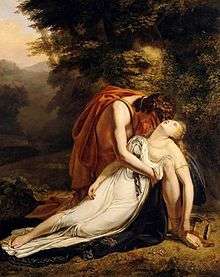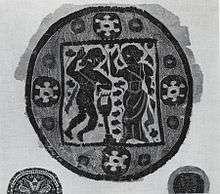Orpheus and Eurydice
The ancient legend of Orpheus and Eurydice concerns the fateful love of Orpheus of Thrace, son of Apollo and the muse Calliope, for the beautiful Eurydice (from Eurudike, "she whose justice extends widely"). It may be a late addition to the Orpheus myths, as the latter cult-title suggests those attached to Persephone. It may have been derived from a legend in which Orpheus travels to Tartarus and charms the goddess Hecate.[1]
Versions
In Virgil's classic version of the legend, it completes his Georgics, a poem on the subject of agriculture. Here the name of Aristaeus (ar-is-tee'us), or Aristaios, the keeper of bees, and the tragic conclusion, was first introduced.[2]
Ovid's version of the myth, in his Metamorphoses, was published a few decades later and employs a different poetic emphasis and purpose. It relates that Eurydice's death was not caused by fleeing from Aristaeus, but by dancing with naiads on her wedding day.
Other ancient writers treated Orpheus' visit to the underworld more negatively. According to Phaedrus in Plato's Symposium,[3] the infernal deities only "presented an apparition" of Eurydice to him. Plato's representation of Orpheus is in fact that of a coward; instead of choosing to die in order to be with his love, he mocked the deities in an attempt to visit Hades, to get her back alive. As his love was not "true" — meaning that he was not willing to die for it — he was punished by the deities, first by giving him only the apparition of his former wife in the underworld and then by having him killed by women.[3]
Plot
Apollo, a Greek god, gave his son Orpheus a lyre and taught him how to play. Orpheus played with such perfection that even Apollo was surprised. It is said that nothing could resist his music and melody, neither enemies nor beasts. Even trees and rocks were entranced with his music.
Orpheus fell in love with Eurydice, a woman of unique beauty and grace, whom he married and lived happily with for a short time. However, when Hymen was called to bless the marriage, he predicted that their perfection was not meant to last.
A short time after this ominous prophecy, Eurydice was wandering in the forest with the Nymphs, when Aristaeus, a shepherd, saw her and was beguiled by her beauty. He made advances towards her and began to chase her when she attempted to flee. As Eurydice sprinted through the forest, she managed to escape him, but was tragically bitten by a snake and died instantly.
Orpheus sang his grief with his lyre and managed to move everything living or not in the world; both humans and gods were deeply touched by his sorrow and grief.
Apollo then advised his son to descend to Hades and see his wife. Any other mortal would have died, but Orpheus, protected by the gods, went to Hades and arrived at the infamous Stygian realm, passing by ghosts and souls of people unknown. He also managed to charm Cerberus, the monster known to have three heads. Orpheus presented himself in front of the god of the Underworld Hades (Pluto) and his wife Persephone.
Orpheus played his lyre, melting even Hades' cold heart. Hades told Orpheus that he could take Eurydice with him but under one condition; Eurydice would follow him while walking out to the light from the caves of the Underworld, but he should not look at her before coming out to the light because he would lose her forever. If Orpheus was patient enough he would have Eurydice as a normal woman again by his side.
Orpheus was delighted; he thanked the gods and left to ascend to the world. He was trying to hear Eurydice’s steps, but he could not hear anything and he started believing that the gods had fooled him. Of course Eurydice was behind him, but as a shadow, waiting to come to light to become a full woman again. Only a few feet away from the exit, Orpheus lost his faith and turned to see; Eurydice was behind him, but her shadow was whisked back among the dead. Eurydice was gone forever.
Orpheus tried to return to the Underworld but a man cannot enter the realm of Hades twice while alive. According to various versions of the myth, Orpheus started playing a mourning song with his lyre, calling for death so that he could be united with Eurydice forever. Orpheus is ultimately killed either by beasts tearing him apart, or by the Maenads, in a frenzied mood. According to another version, Zeus decided to strike him with lightning knowing Orpheus would reveal the secrets of the Underworld to humans.
In any case, Orpheus died but the Muses decided to save his head and keep it among the living people to sing for ever, enchanting everyone with the lovely melodies and tones.
Works employing this legend
Literature
- The Death of Eurydice episode which occurs in Book X of Metamorphoses by Ovid (8 AD)
- The poem Orpheus and Eurydice in The Consolation of Philosophy by Boethius (594 AD)
- Sir Orfeo, anonymous narrative poem (c. late thirteenth century)
- The Tale of Orpheus and Erudices his Quene, poem by Robert Henryson (c.1470)
- Sonnets to Orpheus, allusive sonnet sequence by poet Rainer Maria Rilke (1922)
- The Einstein Intersection, novel by Samuel R. Delany (1967)
- Gravity's Rainbow, novel by Thomas Pynchon, (1973)
- The Ground Beneath Her Feet, novel by Salman Rushdie, (1999)
- Eurydice a poem by Carol Anne Duffy in her collection of revisionist poems, The World's Wife. (1999)
- Veniss Underground, novel by Jeff Vandermeer, (2003)
- Enchanted Fire a romance novel by Roberta Gellis, (1996)
- Poetry and Fear a novel by Grace Andreacchi, (2008)
- Syringa, a poem by John Ashbery, later set to music by Elliott Carter
- Hymn to Persephone a poem by Craig Arnold in Made Flesh (2008.)
- Orpheus. Eurydike. Hermes, a poem by Rainer Maria Rilke, (1907)
- Cocktails with Orpheus,[4] a poem by Terrance Hayes, (2008)
- A Song for Ella Grey, novel by David Almond
- Bone Gap, novel by Laura Ruby
- Goat Song, a novelette by Poul Anderson (1972)
- State of Wonder, a 2011 novel by American author Ann Patchett
Film and drama
- The Orphic Trilogy, series of films by Jean Cocteau (1930-1959)
- Eurydice (Anouilh play), play by Jean Anouilh (1941)
- Orpheus Descending, play by Tennessee Williams (1957)
- Black Orpheus, film by Marcel Camus (1959)
- Evrydiki BA 2O37, 1975 film directed by Nikos Nikolaidis.
- An episode of The Storyteller: Greek Myths (1990)
- Orfeu, film by Cacá Diegues (1999)
- Metamorphoses, play by Mary Zimmerman (2002)
- Eurydice (Ruhl play), play by Sarah Ruhl (2003)
- Hadestown, folk opera by Anaïs Mitchell (2006)
- Orpheus and Eurydice: A Myth Underground, theatre production written by Molly Davies with music by James Johnston, Nick Cave and the Bad Seeds for the National Youth Theatre at the Old Vic Tunnels, directed by James Dacre (2011)
- Orpheus & Eurydice (musical), musical by Andrew Hanley and Melissa Nally (2011)
- Looper (film), film by Rian Johnson (2012)
- You Ain't Seen Nothin' Yet, film by Alain Resnais (2012)
- Orpheus and Eurydice, play by Annie Fan and Melissa Wilkinson (2013)
- To Hell and Back, musical by Joel B. New (2013)
Music and ballet
- Euridice (opera), opera by Jacopo Peri and Giulio Caccini with librettist Ottavio Rinuccini (1600)
- L'Orfeo, first opera composed by Monteverdi (1607)
- Orfeo ed Euridice, opera by Christoph Willibald Gluck (1762)
- Orpheus in the Underworld, operetta by Jacques Offenbach (1858)
- Orpheus und Eurydike, opera by Ernst Krenek (1926)
- Orpheus (ballet), ballet made by choreographer George Balanchine to music by Stravinsky (1948)
- Orpheus and Eurydice (rock opera), rock opera album by Alexander Zhurbin (1975)
- The Mask of Orpheus, opera by composer Harrison Birtwistle and librettist Peter Zinovieff (1986)
- Metamorpheus, orchestral album by former Genesis guitarist Steve Hackett (2005)
- Eurydice song by Sleepthief featuring Jody Quine (2006)
- Hadestown, album of songs from the folk opera of the same name by Anaïs Mitchell (2010)
- From the Underworld, song by the British band The Herd, written by Ken Howard and Alan Blaikley (1967)
- Orpheus X, rock opera by Rinde Eckert (2007)
- Syringa, by Elliott Carter, based on John Ashbery's poem of the same name
- Abattoir Blues/The Lyre of Orpheus, an album by Nick Cave and The Bad Seeds (2004)
- Don't Look Back, a song by She & Him, written by Zooey Deschanel (2008)
- Beat of her Heart, a song by Gungor (2013)
- The cover of the album Reflektor (2013) by Arcade Fire contains a picture of Auguste Rodin's sculpture of Orpheus and Eurydice, and the album contains a narrative arc based on the story.[5]
- Orpheus mourning, song by the Spanish band As Light Dies (2014)
- Orphée, an album by Jóhann Jóhannsson (2016)
Visual arts

- Orpheus and Eurydice, stone relief, second century, Šempeter, Slovenia
- Orpheus and Eurydice, 1511 painting by Titian
- Orpheus and Eurydice, 1650–1651 painting by Poussin
- Orpheus and Euridice by Federico Cervelli
- Orpheus and Eurydice, 1862 painting by Edward Poynter
- Orpheus and Euridice, 1864 painting by Frederic Leighton
- Orpheus and Eurydice, 1893 sculpture by Auguste Rodin
- Orpheus searching Eurydice in the Underworld,[6] painting by the Antwerp school
Videogames
- The Battle of Olympus, NES and Game Boy video game by Infinity
- Don't Look Back (video game), Atari VCS-styled Flash game by Terry Cavanagh
Comics
- The Sandman (Vertigo), The Song of Orpheus, by Neil Gaiman
References
- ↑ Robert Graves, The Greek Myths, Penguin Books Ltd., London (1955), Volume 1, Chapter 28, "Orpheus", p. 115.
- ↑ M. Owen Lee, Virgil as Orpheus: A Study of the Georgics, State University of New York Press, Albany (1996), p. 9.
- 1 2 Symposium 179d-e.
- ↑ "Cocktails with Orpheus by Terrance Hayes". 4 November 2016.
- ↑ "Staying Serious, to a Joyful Beat". The New York Times. 29 October 2013.
- ↑ http://www.wikigallery.org/wiki/painting_362591/Antwerp-School/Orpheus-Searching-Eurydice-In-The-Underworld-%28Met.-10-11-63%29
External links
![]() Media related to Orpheus and Eurydice at Wikimedia Commons
Media related to Orpheus and Eurydice at Wikimedia Commons
